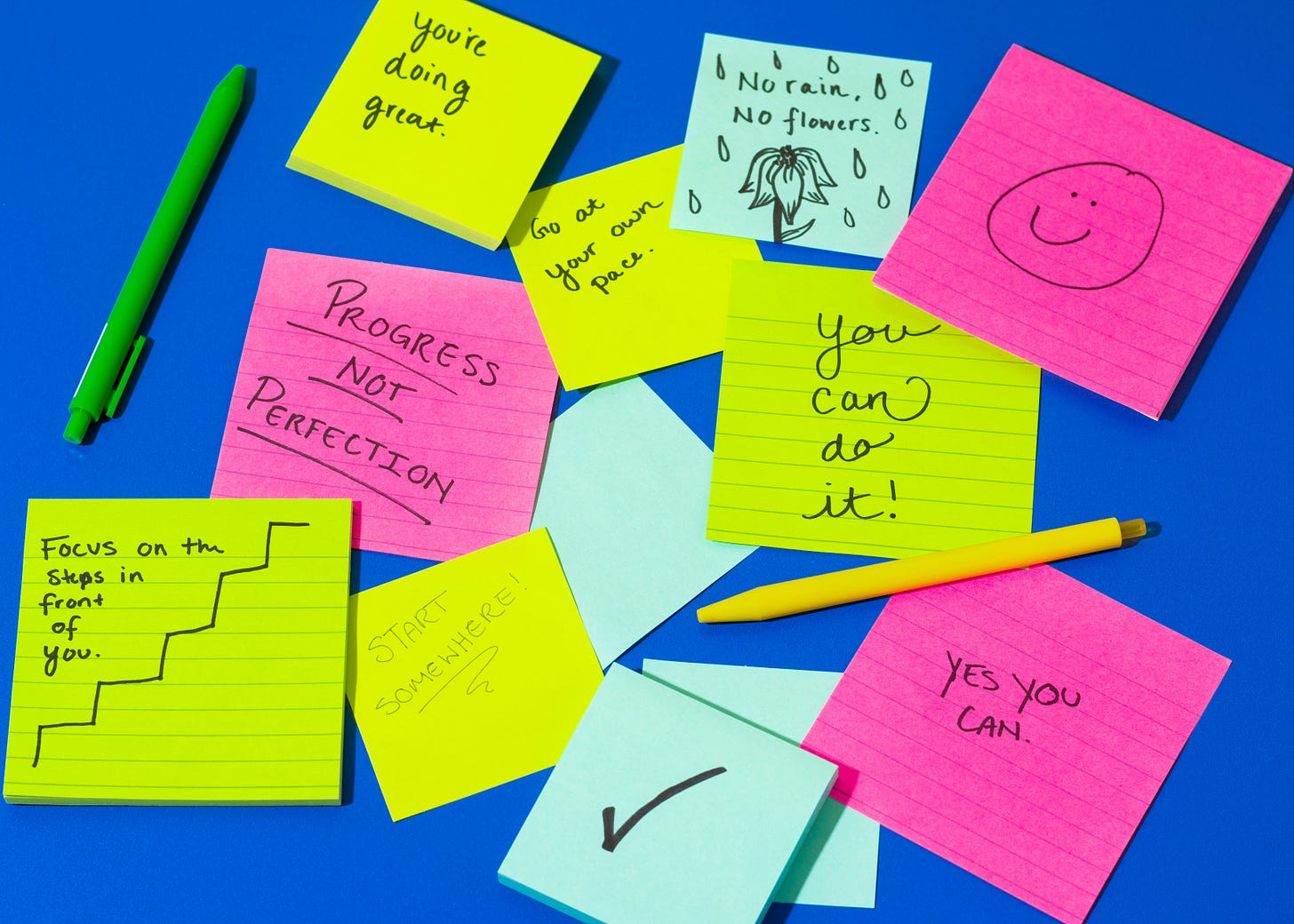The Science-Backed Guide to Building Lasting Habits
What Research Really Says About Changing Your Life
I’m Nahid, “the nervous system whisperer” an Author and somatic movement educator. I guide clients move out of patterns of burnout, anxiety, stress and trauma with The Soothe Programme.
Undo your patterns of anxiety in 30 days. This programme will rewire your brain to feel differently. The Soothe Anxiety: 30 Days Somatic Release £97 Start right now.
Buy Soothe UK out now in paperback / Soothe US
Hello, how are you doing? If you're reading this, chances are you've stood at the starting line of a new habit before - full of hope and determination - only to find yourself back at square one a few weeks later. This is what most clients struggle with - but know that the dropping out of a habit and going back again are part of the process of habit forming.
Here's what I've learned from diving deep into the latest neuroscience research: building lasting habits isn't about grinding through with sheer determination. It's about working with your brain's natural tendencies, not against them. The science behind habit formation has revealed some truly fascinating insights that can transform how you approach change, let’s dive in.
The Neuroscience Behind Habit Formation: Your Brain's Hidden Superpower
Let me paint you a picture of what's happening inside your brain when you're trying to build a new habit. Your brain essentially has two systems: one that seeks efficiency and automation, and another that makes conscious, deliberate decisions.
When you're first learning a new habit, your conscious mind is doing all the work. But as you repeat the behaviour consistently, something beautiful happens.
Your brain literally rewires itself, creating new neural pathways in an area called the basal ganglia - your brain's habit headquarters. It's like walking through a field of tall grass: the first time is difficult, but each subsequent walk makes the path clearer and easier to follow.
Here's what might surprise you: dopamine, that feel-good neurotransmitter, gets so efficient that it starts firing before you even complete the behaviour, it's anticipating the reward. This is why established habits feel so compelling and automatic.
You have heard that it takes 21-days to form a habit..? Recent research has completely debunked this oversimplification. Studies show that habit formation actually takes between 59 and 66 days on average, but the timeline can range anywhere from 4 to 335 days. When you understand that some habits might take nearly a year to become automatic, you can approach the process with much more patience and self-compassion.
The Four Pillars of Effective Habit Formation
Over the years of studying habit formation, I've noticed that successful habit builders follow four key principles.
1. Make It Obvious: Working with Your Brain's Pattern Recognition
Your brain is constantly scanning your environment for cues. Design your space so that good habits practically jump out at you. That water bottle on your desk, those workout clothes laid out the night before - these aren't just reminders, they're environmental cues that do the heavy lifting for you.
2. Make It Attractive: Tapping into Your Natural Motivation
We're motivated as much by anticipation as by actual rewards. Make your habits more appealing through "temptation bundling" - pairing something you need to do with something you enjoy. I listen to podcasts when I am doing the house admin: dusting, putting away clothes, cleaning and ironing.
3. Make It Easy: The Life-Changing Power of Tiny Steps
The habits that stick are often the ones that feel almost ridiculously easy at first. Start incredibly small to remove the activation energy barrier. Five push-ups instead of an hour workout. One page of reading instead of a whole chapter. Weeding for 10 minutes a day. Success breeds success, and you'll naturally expand from there.
4. Make It Satisfying: Creating Immediate Rewards
Your brain prioritises immediate rewards over long-term benefits. Create immediate satisfaction through habit tracking, small rewards, or connecting the behaviour to your identity. Instead of "I'm going to exercise more," think "I'm someone who loves t move."
The Game-Changer: Habit Stacking
Let me tell you about one of the most powerful techniques I've encountered: habit stacking. You take an existing habit that's already automatic and attach a new habit to it. You're hijacking neural pathways that already exist to build new ones.
The formula is simple: After/Before [CURRENT HABIT], I will [NEW HABIT]
Examples that work beautifully:
"Before I brush my teeth, I will breathe for 20 minutes.”
"After I pour my morning coffee, I will write down three things I'm grateful for"
"Before I sit down for dinner, I will put my phone in another room"
"After I close my laptop at work, I will do 10 minutes of dancing off my stress"
This leverages parts of your life that are already on autopilot. Your existing routine naturally triggers the new behaviour, it's like having a built-in reminder system that never forgets.
Implementation Intentions
Here's another research-backed technique: creating specific "if-then" plans that link situations to desired responses. People who make these specific plans are significantly more likely to follow through than those who just set general goals.
The format is: "If [SITUATION], then I will [BEHAVIOUR]"
Examples:
"If someone is irritating me, then I will take five breaths"
"If I'm tempted to check social media, then I will read one page of a book instead"
If I’m feeling stressed, I will get up and shake it out”
This removes decision-making from your future self. You've already decided what to do when you're stressed or distracted, creating a mental shortcut that makes the right choice easier.
The Most Powerful Shift: From Doing to Being
Here's what I believe is the most transformative aspect of habit formation: focusing on the type of person you want to become rather than just what you want to do.
Instead of "I want to run a marathon," think "I am a runner." Instead of "I want to lose weight," consider "I am someone who prioritises their health ."
This identity-based approach works because it aligns your actions with your self-concept, making the behavior feel more authentic. When you see yourself as "someone who exercises," going to the gym isn't a chore - it's just what you do because it's who you are. Every time you perform your desired behaviour, you're declaring your intention for the type of person you want to become.
Common Pitfalls to Avoid
The All-or-Nothing Trap: Missing one day doesn't mean you've failed. Research shows that missing one day doesn't significantly impact long-term habit formation. Get back on track quickly rather than giving up entirely.
The Ambition Trap: Don't try to overhaul your entire life at once. Start with one small habit, master it, then add another. Your brain has limited capacity for conscious decision-making.
The Environment Trap: Your surroundings have enormous power over your behaviour. Set yourself up for success by making good choices easier and bad choices harder.
The Patience Trap: Meaningful change takes time. Focus on consistency rather than perfection, and trust that small actions compound into remarkable results.
Your Personal Habit-Building Roadmap
Let's create a practical plan for implementing these insights in your own life:
Choose One Starting Point: Pick just one habit to focus on initially. Ask yourself: "If I could only change one thing about my daily routine, what would have the biggest positive impact?"
Get Specific: Instead of "I want to exercise more," try "I will do 10 push-ups in my living room immediately after I brush my teeth in the morning."
Start Embarrassingly Small: Choose a version that feels almost ridiculous. Two minutes of meditation, one page of reading, a few push-ups. You can always do more, but establish the pattern first.
Find Your Anchor: Look for an existing habit that's already solid in your routine to use for habit stacking.
Track Simply: Use a basic method like marking an X on a calendar to monitor your progress.
Plan for Obstacles: Think about what might get in the way and create specific strategies for each potential barrier.
Practice Self-Compassion: You will have off days. Treat yourself with kindness and get back on track quickly.
A Final Thought: The Long Game
Building good habits isn't really about the habits themselves, it's about becoming the person you want to be. Every small action you take is a vote for your future self. The research shows that small, consistent actions compound over time to create extraordinary results and an extraordinary you.
Your brain is remarkably adaptable and just waiting for consistent input to create new, positive patterns. Start where you are, with what you have, and trust the process.
Your Science-Backed Takeaways
Habits typically take 59-66 days to form, not 21 days, so give yourself time. Use environmental design and habit stacking to make success easier. Start incredibly small to build momentum. Frame habits around identity, not just outcomes. Expect setbacks and plan for them. Most importantly, consistency beats intensity every time.
You know what works every time? This work. Come and join me on Sunday at 5 pm for the monthly soothe sessions. If you want to change the way you think, change the way you feel. It works! Become a paid subscriber today.
Coming up…
I created The Soothe Retreats not just as a break, but as a repatterning.
A nervous system reset that doesn’t dissolve the second you open your laptop again. You’ll walk slower. Sleep deeper. Eat nutritious food without tracking time.
You’ll move, breathe, release… not because you “should,” but because your body starts asking for it.
You’ll remember what it feels like to live inside yourself again. And here’s the real shift:
This retreat don’t just change how you feel while you’re there.
It changes how your system responds to life when you come home. Because when your nervous system knows what safety feels like, you stop chasing it. Here are the in-person retreats coming up:
The Soothe Day retreat - 20th September 2025 click here to find out more
The Soothe Weekend in Kent - 10th - 12th October 2025 - en-suite rooms and beds in a dorm still available. This isn’t on the website - please message “weekend”
The Soothe Weekend in Greece - 27th June - 4th July - the first villa is now full, get booking - details here.
For paid subscribers, I can’t wait to see you on Sunday at 5 pm for the Sunday Somatic Soothe Session ( all the S’s)
Not yet a member? It’s time to sign up!
Stay human,
Nahid x
Keep reading with a 7-day free trial
Subscribe to Soothe with Nahid de Belgeonne to keep reading this post and get 7 days of free access to the full post archives.





